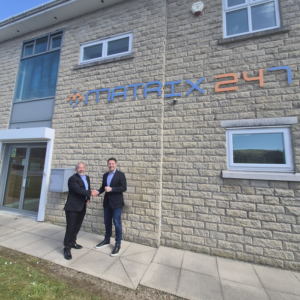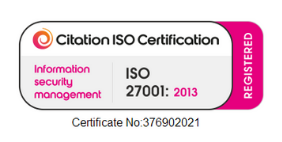How Long Does Cloud Migration Take?
Migrating your current IT infrastructure to the cloud can offer businesses of all industries and sizes a number of benefits. However, ensuring you are informed of the process and timescales, are working with the right partner, and understand how it will transform your business operations, is imperative to any migration.
The timescale of cloud migrations hugely depends on a number of factors, which we’ll explore in this guide. Typically, for a small to midsize business they can take between 1 to 6 months, depending upon the scale of the project and the level of support you will receive from an IT partner, from start to finish.
Get in touch with our team for support with your cloud migration strategy today.
Navigating Cyber Security
Download your copy of the FREE e-book today
- Understanding the evolving cyber security landscape
- Effective security tools & measures
- Cybersecurity defence features
- Frameworks & disaster recovery plan best practices

Factors that determine how long cloud migration takes
The duration of a cloud migration can vary quite significantly based upon several factors. There really isn’t a one size fits all, whilst there’s a number of helpful resources, tips, and insights, your strategy and timescale will be bespoke to your business.
The most common factors that can impact the timescale of a cloud migration are:
- The size of your business
- The scale, volume of data, and complexity of the migration itself
- The age of your existing IT assets
- Your connectivity and network bandwidth
- Business culture and user engagement
- Data security and compliance
Cloud Migration Timeline
Whilst the timeline will be varied, most cloud migrations have the same structural process which we’ve outlined below:

Discovery
Firstly, we would engage with you to better understand your requirements and objectives. We’d then perform an assessment of your existing infrastructure including; hardware, infrastructure, data and applications across your business.
Estimated time – 3 days to 2 weeks
Planning
With a detailed scope we can then move into the planning phase, including timescales, investment, resources, mitigating risks, security and much more. This is where our experiences and expertise particularly comes in handy!
Estimated time – 3 days to 3 weeks
Delivery
This is the ultimate step, the implementation and migration of the project. We’ll also ensure you are confident and informed of your new system/s and its operations.
Estimated time – a few days to a few weeks
Testing & Optimisation
The cloud migration is not actioned until we perform all tests and ensure all assets are unchanged and have migrated successfully. We’ll validate this before performing the actual switch.
Estimated time – 1 day to 1 week
Ongoing developments
Don’t stop here. In our digital, fast-paced, modern world, it’s important to continually review and optimise your infrastructure to maximise performance and lower operational costs. We will help you do that with our ongoing support and frequent reviews.
If you’d like more information about the process check out our cloud migration checklist to help you on your journey.
Timeline differences between small and large-scale migration projects
Remember, every business’s cloud migration journey is different, with its own set of objectives, timescales, challenges and opportunities.
The process of cloud migration for most businesses typically takes between 1 to 6 months, however this can be longer if a larger scale migration project is required, or if complexities occur.
We’ve worked with many businesses to start their cloud migration journey with a transfer of data initially, before progressing with further assets over a period of a few months to over a year. The planning and implementation of smaller migration tasks can take just a few weeks. This phased approach assists many businesses with the change management and supports the continued momentum of their journey.
Can you speed up a cloud migration?
Once you have determined your cloud migration strategy, timescale and budget with your preferred partner, we’d advise to work accordingly with this. Yes, there’s often things that can crop up that can impact both positively and negatively on the timeline of the migration project, but a good partnership should involve frequent communication and flexibility along the way.
You don’t want to rush your cloud migration and be left to unpick a bigger mess than beforehand – Oh yes, this does happen. We have been witnesses to this from customers that have drafted us in to re-navigate the project successfully.
If you’re keen to get your cloud migration moving quickly, it’s all in the preparation and decision making. Liaise and select a cloud migration partner immediately and get to work on the project as a priority with all relevant stakeholders engaged and on the same page from the very beginning. This helps any confusion or hold ups further down the line too. Planning and testing are also fundamental, so there’s no nasty surprises.
An alternative method, which can be seen to be simpler, however not necessarily quicker, would be to take a phased approach. An incremental migration, basically migrating assets in smaller, ongoing, rather than all at once can help many businesses tackle what can appear a large, complex, and time consuming cloud migration, into a more manageable project.
How working with cloud migration consultants streamlines the process
It’s important to carefully plan prior to the actual migration, along with a detailed plan including ongoing support, training and review post-deployment for maximum, continued success.
As with anything in business, if the strategy is poor, the desired outcome will not be met. This could also result in a loss of time, resources and funds. In order to avoid this, and help to streamline the process, so that you can focus on what you do best, engage with a cloud migration consultant at the earliest point.

Leveraging the benefits of the cloud by migrating your services and data with an expert provider like Matrix247 will maximise your investment. We work as a trusted partner to analyse and advise you, developing a cloud migration strategy relevant to your business, realistic timelines and meeting budget expectations.
Latest Blogs News Articles Events

Matrix247 has been acquired by Focus Group
Focus Group, a leading provider of business technology, has acquired Matrix247 to strengthen comms and managed IT portfolio.

Top IT trends for SME’s in 2025
By leveraging advanced technology, SMEs can improve operational efficiency, gain a competitive advantage, and provide quality customer experiences despite the ongoing difficulties.

Cloud Phone System Alternatives
There are alternatives to cloud telephony, which are typically based on older technologies as many businesses haven’t made the switch to modern communication methods.




